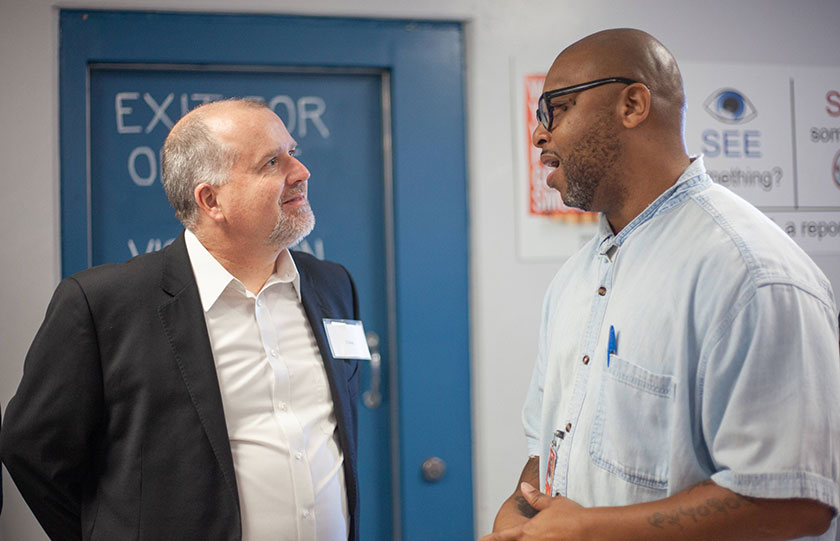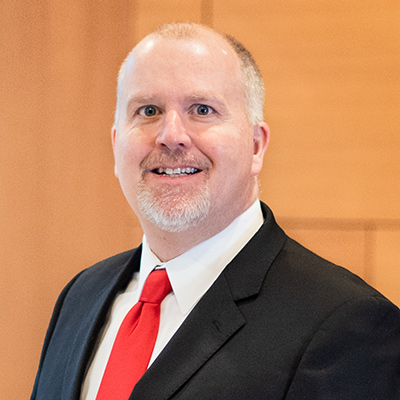Craig DeRoche talks justice reform and Prison Fellowship's legacy of advocacy.

In honor of World Day of Social Justice, we asked Craig DeRoche, our senior vice president of advocacy and public policy, to explain what social justice is and why it matters to followers of Christ.
PRISON FELLOWSHIP: Why is Prison Fellowship® involved in advocacy and public policy?
Craig DeRoche: Prison Fellowship started by serving people individually in prisons. [Our founder] Chuck Colson saw the absence of hope and programs that were consistent with our faith as Christians inside prisons. While that was a good ministry and mission, it wasn't enough. The structure of the justice system itself was preventing people from transforming their lives. It wasn't just not doing a good job, but the structure was wrong. Consequently, it wasn't in line with our values as Christians.
So, Prison Fellowship started speaking into the government and policies in America with the experiences of people who have gone through the system and showing that there's a better way to carry out justice. We advocate for the inherent, God-given rights of everyone—the victim, the person who committed the crime, and the community. We speak to those in power and serve as subject matter experts with public policy.
Why do you do this kind of work?
The gift I received in Christ is what motivates me. At 34, I became the speaker of the Michigan House of Representatives. Later, I made national headlines in 2010 for two alcohol-related arrests, revealing a long-concealed addiction to alcohol. It was only after my arrests, rehab, and a renewed focus on my Christian faith that I entered lasting recovery. In a moment, God removed me from a 29-year slavery to addiction. I'm overwhelmed and grateful for that. Therefore, I want as many people on earth to receive the same thing as I had.
What does "social justice" mean to you?
In the Bible, it says that righteousness and justice are the throne of God [Psalm 89:14]. They're foundational elements to our faith and to the construct of any government, culture, or society. I think social justice is a calling that we all should join and participate in, in a free society. But we should not turn it into a finger-pointing exercise on one issue versus another. Social justice and identity politics should not be conflated.
Prison Fellowship engages in social justice through justice reform? How can people get involved in reform work?
Jesus, in Matthew 25, says to visit the prisoner. But visiting the prisoner can be an overwhelming task to know where to get started.
That's why Prison Fellowship stands in the gap to make that possible. For example, we offer help with learning about [justice reform advocacy] and advocating for cultural change and legislative reforms that advance proportional punishment, constructive prison culture, and second chances. We also offer help with serving people who are currently incarcerated or those who are returning home. We make that available through signing the Justice Declaration and becoming a Justice Advocate or volunteering inside and outside of prisons, and much more. This is how we let our lights shine in the community.
How does Prison Fellowship effect social change?
The biggest example of how we speak into the culture is Second Chance® Month. It's now going into its fourth year and has been endorsed by the president, dozens of jurisdictions, and 350+ organizations. Second Chance Month brings people together in the culture in a place where the Church is working alongside secular organizations. We derive our values from a different place, yes. But we share the belief that each person who has paid their debt should be afforded a second chance.
Why has Prison Fellowship been a leading voice for so many years?
We were founded by a person [Chuck Colson] who was convicted of a felony and went to prison. He used his experience there to help inform his beliefs after. Today more than a quarter of Prison Fellowship's field workforce has spent a significant amount of time in prison, including the leaders of many of our Prison Fellowship Academy® sites inside the prisons.
We welcome the professional help of academics and professionals who have helped us grow our mission. But we've also always relied on people who have spent time in the justice system themselves. Both of these—professionals and the formerly incarcerated—work in concert to carry out our work. And we believe God has blessed that mission and will continue to.

ABOUT CRAIG DEROCHE
Craig DeRoche leads Prison Fellowship’s criminal justice reform efforts. He was the youngest statewide Republican leader in the country and was elected Michigan Speaker of the House. In 2010, after serving a full tenure in the state legislature, DeRoche made national headlines with two alcohol-related arrests. It was only after his arrests, rehabilitation, and a renewed focus on his Christian faith that DeRoche escaped from his life-long struggle with alcoholism. He has been sober since 2010.
GET INVOLVED
Do you share our passion for justice reform? Do you want to help change in the criminal justice system? Sign the Justice Declaration today. The Justice Declaration is a call to the Church to deploy its unique and unparalleled capacity to respond to crime and overincarceration. When you sign, you'll be added to our list of Justice Advocates. We email advocates regularly about simple ways to take action and raise their voices for justice that restores.
DID YOU ENJOY THIS ARTICLE?
Make sure you don' t miss out on any of our helpful articles and incredible transformation stories! Sign up to receive our weekly newsletter, and you' ll get great content delivered directly to your inbox.
Your privacy is safe with us. We will never sell, trade, or share your personal information.